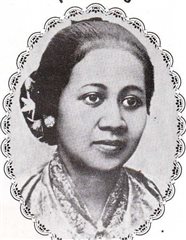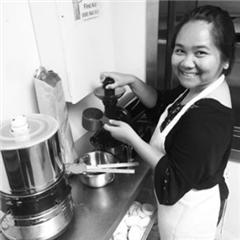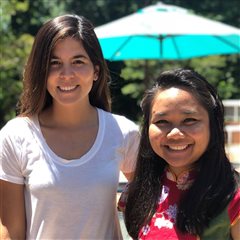Kartini Chocolate is “a premium bean-to-bar chocolate company featuring Indonesian dark chocolate while also empowering women and bettering the lives of Indonesian cocoa bean farmers,” states Kartini Chocolate founder Nagea Delaya. “But Kartini isn’t actually a ‘what’, it’s a ‘who’,” she added.
 Raden Adjeng Kartini (1879-1904) was an Indonesian noblewoman turned women’s rights activist. In a time when education for women in Indonesia was essentially nonexistent and “not to marry… [was] the greatest disgrace a native girl [could] bring to her family,” as written in Kartini’s letters published posthumously as Letters Of A Javanese Princess in 1911, Kartini strove to free herself from the traditions holding her and other Indonesian women back. “If the laws of my land permitted it, there is nothing that I had rather do than give myself wholly to the working and striving of the new woman… but age-long traditions that cannot be broken hold us fast cloistered in their unyielding arms,” Kartini wrote. “All our institutions are directly opposed to the progress for which I so long for the sake of our people… [but] someday, those arms will loosen and let us go.”
Raden Adjeng Kartini (1879-1904) was an Indonesian noblewoman turned women’s rights activist. In a time when education for women in Indonesia was essentially nonexistent and “not to marry… [was] the greatest disgrace a native girl [could] bring to her family,” as written in Kartini’s letters published posthumously as Letters Of A Javanese Princess in 1911, Kartini strove to free herself from the traditions holding her and other Indonesian women back. “If the laws of my land permitted it, there is nothing that I had rather do than give myself wholly to the working and striving of the new woman… but age-long traditions that cannot be broken hold us fast cloistered in their unyielding arms,” Kartini wrote. “All our institutions are directly opposed to the progress for which I so long for the sake of our people… [but] someday, those arms will loosen and let us go.”
Mirroring R.A. Kartini’s ideals of equality, entrepreneurial spirit, and women empowerment, the eponymously named startup Kartini Chocolate is working to give back to Indonesian cocoa bean farmers and enable women to attend school. “Kartini was an entrepreneur, helped to empower women, and was a person who broke the right rules,” Nagea says, “and I think that is everything we’re trying to do at Kartini Chocolate.”
“I, just like Nagea, knew that I eventually wanted to run my own company,” adds Kartini Chocolate co-founder Ana Maria Chamorro. “So when Nagea told me about her company, I thought, ‘Wow, someone else has an idea that perfectly aligns with my interests and passions.’ So, I told her I would be more than happy to join her team because I truly believed in the idea from both a business perspective and on a personal level…and that's how the Kartini team came to be.”
***
Indonesia is the world’s third largest cocoa bean grower behind Côte d’Ivoire (Ivory Coast) and Ghana, with approximately 290,000 tons of cocoa beans exported in 2017 according to the International Cocoa Organization, also known as the ICCO. However, the cocoa bean production and distribution process in Indonesia “does not reflect equal power relationships in the cocoa chain,” as described in an ICCO report. “At the end of the day, the cocoa bean farmers only get 5% or less of the profits of the total value chain of chocolate production and are living on approximately two US dollars per day,” Nagea says. “That really troubles me, especially being Indonesian myself.”
***
The Kartini Chocolate team wants to combine social impact with a sustainable business, an ideal that has kept the two founders going through the tough times. “I think there is a misconception about making an impact and creating profit, that somehow you cannot pursue both simultaneously,” Ana Maria says. “I don't think it has to be that way. Through making profit, we want to better the lives of the farmers that we work with, and make consumers more conscientious about what they're putting in their mouths. I think we can really make a big impact that way,” she says resolutely.
On the first front of giving back to their farmers, the Kartini team has decided to do something more than just give their cocoa bean farmers a larger cut of the proceeds. “7% of our profits go to education and empowerment for women,” Nagea elaborates. ‘Right now, that is going to Indonesia where our farmers are currently, where we will be working with a nonprofit organization to channel that money appropriately towards female education. We also want to be setting standards for others in the industry with how we treat farmers. This is a global issue, and one we would love to work towards changing. We want to show people, ‘Hey, you can still make money by doing the right and ethical thing.’”
 But Kartini Chocolate wants their consumers to be more conscious of their health as well. “Cacao and sugar. That’s all that is in our chocolate,” Ana Maria says. “It is the purest and most real form of chocolate that you can eat. This won’t taste like the chocolate you know -- and it also has lots of health benefits.”
But Kartini Chocolate wants their consumers to be more conscious of their health as well. “Cacao and sugar. That’s all that is in our chocolate,” Ana Maria says. “It is the purest and most real form of chocolate that you can eat. This won’t taste like the chocolate you know -- and it also has lots of health benefits.”
There has been extensive research on dark chocolate and its positive effects on the human body. Harvard’s School of Public Health section regarding dark chocolate cites reduced risk of diabetes and heart disease as potential benefits of a healthy intake of dark chocolate. A 2011 study released by the Yale University Prevention Research Center expanded greatly on the various healthy components in dark chocolate, concluding that “research to date suggests that the benefits of moderate cocoa or dark chocolate consumption likely outweigh the risks.”
Doctor Lee S. Berk, Associate Dean of Research Affairs at Loma Linda University and co-author of two studies on dark chocolate presented at the 2018 Experimental Biology Conference in San Diego, California, explains his findings. "For years, we have looked at the influence of dark chocolate on neurological functions from the standpoint of sugar content - the more sugar, the happier we are," Berk said in a news release from Loma Linda University. "This is the first time that we have looked at the impact of large amounts of cacao in doses as small as a regular-sized chocolate bar in humans over short or long periods of time, and are encouraged by the findings. These studies show us that the higher the concentration of cacao, the more positive the impact on cognition, memory, mood, immunity and other beneficial effects."
***
 Nagea and Ana Maria had some final thoughts on their experiences thus far working together at the iLab. “It's inspiring to me to be sitting here at the iLab and have people around me that are similarly motivated,” Ana Maria says. “They come in, and they don't have a set agenda, like you often do in a corporate setting, because none of us do. We just make things happen. But even without having that kind of schedule, you see people walk in early every morning and stay long hours, not because they are required to, but because they want to,” she summarized.
Nagea and Ana Maria had some final thoughts on their experiences thus far working together at the iLab. “It's inspiring to me to be sitting here at the iLab and have people around me that are similarly motivated,” Ana Maria says. “They come in, and they don't have a set agenda, like you often do in a corporate setting, because none of us do. We just make things happen. But even without having that kind of schedule, you see people walk in early every morning and stay long hours, not because they are required to, but because they want to,” she summarized.
“We can be flexible with our hours, be project-based, and I’ve realized that I like handling several things at the same time,” Nagea says, reflecting. “Somehow I work better that way instead of doing just one thing. I remember when I was just working on production, I got frustrated very easily. However, when I paired that with some design review, customer discovery, and all sorts of other things, it became much more manageable.”
***
Ultimately, though, the goal of bringing prosperity and education to their farmers and employees is always at the forefront of Nagea and Ana Maria’s thoughts and actions. “The one thing that motivates me the most, and I repeat it to myself and to Nagea whenever we are going through a rough patch, is that at the end of the day, we are doing this for other people and to make the world a better place,” Ana Maria says with a contented smile.
***
To explore Kartini Chocolate’s offerings and learn more about their mission, you can find their website at www.kartinichocolate.com. You can also follow them on Instagram and Facebook.
***
About The Team

Nagea Astiarini Delaya (right) received her B.Eng. in Industrial Engineering in 2010 from the Institut Teknologi Bandung, the oldest technology-focused institution in Indonesia. She received an M.B.A. in Business Administration and Management in 2018 from the University of Virginia Darden School of Business. Nagea has previously worked with Google and BP before founding Kartini Chocolate. She has also been a long time volunteer at Indonesia Mengajar, a national education outreach program in Indonesia.
Ana Maria Chamorro (left) received a degree in International Relations and Affairs from the Universidad del Rosario in 2009 and a degree in Diplomacy and International Relations from Seton Hall University in 2011. She also completed a Business Certification program at Columbia University in 2012, and received an M.B.A. from the University of Virginia Darden School of Business in 2018. Ana Maria has worked with advertising agency MGSCOMM (acquired by Commonground in 2014), designer fashion company Hugo Boss in digital marketing, and has now moved to Google as a global product lead. Ana Maria has volunteered with Fundación Wayra, a social good NGO, since 2006.
